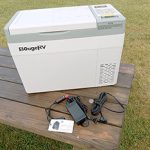
Buying a camper van is an exciting decision, but it can be stressful if you’re concerned about getting your money back when you want to sell it. The truth is that you should think of a camper van as an investment for fun, not a profit. However, many people manage to find ways to maintain their camper van long enough to make a significant amount of their money back.
So, do camper vans hold their value? If you maintain your camper van, there’s no reason why you couldn’t get some of your money back when it’s time to sell it. However, camper vans lose a large chunk of their initial value right when they’re purchased brand-new.
Throughout this post, you’ll learn the following information:
- What affects the value of a camper van?
- Should you buy new or used?
- How to maintain the value of your camper van
- How to know if you’re getting a good deal
- Should you invest in a camper van?
How Quickly Do Camper Vans Lose Value?
At a lot of used RV dealerships, you’ll find some old RVs (which include camper vans) that may be far past their prime. All vehicles wear out eventually, including camper vans, although with proper maintenance, you can, without a doubt, add a few years of usability to most camper vans. Unfortunately, it’s not easy to give an exact estimation of how quickly the value dips.
However, there are a handful of reasons that the value could increase or decrease. Here are five factors:
Renovations are the best possible way to maintain the resell value of a camper van. Ripping out old kitchen appliances or replacing the water pump will definitely make it a popular vehicle when you start to put it on the market. Modernizing the interior appearance goes a long way for potential buyers.
An often overlooked item is regular maintenance, but it’s more than necessary. Even something as small as scheduled fluid changes can make or break a vehicle. Check under the hood regularly to see what needs to have maintenance. Last-minute repairs aren’t enough, though; You have to stay on top of the issues throughout your ownership.
The exterior appearance of the van is also crucial when you’re trying to maintain the value. Even if the inside looks great, a few scratches and patches of rust can quickly lower the price that people will pay for it. Keep an eye out for rust because it can grow and spread in a matter of days.
Water damage will significantly reduce the value of camper vans and all other motorhomes. Once a seal cracks and water starts to leak through, it’s nearly impossible to return it to the same value that it once was. A musty smell, stains on the ceiling or walls, and any indication of mold are all signs of water leaks.
Some underestimated amenities like solar panels, roof vents, coffee machines, and TVs all add tremendous value to a camper van. If you’re buying it brand-new, try to have these custom modifications done before you receive the vehicle. Dealership mods are more trustworthy than at-home DIY mods in the eyes of buyers.
If you want more information on if camper vans are a good investment, read our post here.
Do New Camper Vans Hold More Value Than Used Camper Vans?
It’s no secret that, when you’re buying a car, a brand-new vehicle is always going to resell better than an old rust bucket. However, there are several exceptions in the world of camper vans and RVs. For example, a brand-new RV costs a lot, but it loses thousands of dollars in value from the moment that you take it off of the dealership lot.
Used camper vans have already lost the depreciation value, which means they’re often a better deal in some peoples’ opinions. However, the overall resell price won’t be nearly as high. Let’s analyze the pros and cons of buying camper vans when you’re trying to hold the value. Check out the lists below:
Pros of Buying Used Camper Vans
Used vehicles are obviously always cheaper than new vehicles. You’ll save plenty of money as long as you get a good deal. For more information about making sure that you’re investing in a high-quality camper van, read further into this post. Camper vans can have hidden issues, but you’ll be well equipped to deal with them.
Since you don’t have to absorb the initial depreciation, the turn around resale value will be better for you. For example, if you buy a used camper van for $10,000, you should be able to sell it for around $8,000, even after a few years. Some of the best methods of maintaining camper van value is following the steps mentioned in the previous section.
It usually costs less to insure used camper vans, especially if there is no loan holder involved. Not only is this a good reason to buy a used model, but it’s also an attractive selling point to mention to potential buyers. On top of that, some camper vans may have extended warranties that can carry to a new owner.
Other Posts of Interest
- How High Is A Mercedes-Benz Sprinter Van? A Complete Guide
- Can You Live in a Sprinter Van?
- How To Keep Cool Sleeping In A Van: A Very Practical Guide
Cons of Buying Used Camper Vans
As mentioned earlier, used camper vans are known for having hidden problems. You should thoroughly search for any issues before you invest your hard-earned cash. You should also make sure that you look through the vehicle before selling it. When people find issues that you didn’t know about, they begin to question how well it was maintained.
Although you’re getting a better value when you resell it, it’s much harder to sell an old camper van than a new one. The recent spike in modern advancements makes a new camper van much more popular for potential buyers. Also, an older camper van is more likely to have future mechanical issues making it harder to sell.
Pros of Buying New Camper Vans
All of the new amenities in brand-new camper vans are something that most potential buyers simply can’t pass up. From the latest electronics to swiveling captain’s chairs and even marble floors, the luxurious nature is quite impressive. If you’re considering reselling in the future, then new camper vans will always have a market that’s ready to buy.
The maintenance of a new camper van is easy. All you have to do is following the manufacturer’s recommendations, and you won’t have very many problems at all. With a fresh slate right from the start, you can help the camper van hold its value for many years down the road.
Almost all camper vans and other motorhomes come with warranties. If you plan to own the camper van for only a couple of years before you resell it, chances are the new buyer will be able to use the warranty. It also relieves you from having to buy new parts, which increases the value.
Cons of Buying New Camper Vans

The most apparent disadvantage is the upfront investment. If you’re buying a new camper van, you shouldn’t think about making a profit. You’ll be able to resell it for a high amount of money, but you’ll never make more than you spent. The depreciation and the fact that more advanced models come out annually both make it a tough problem.
If you plan to hold the camper van beyond its warranty, any problems that arise are up to you to fix. Since the vehicle is still relatively new, repair costs can be quite expensive. When you’re selling it to someone else, they’re going to have to consider whether or not they want to deal with such high prices.
How to Maintain the Value of a Camper Van
Whether you’re buying an old or new camper van, maintaining the value is essential if you don’t want to lose any of your money. The good news is that it’s not too challenging, especially if you follow the suggestions below.
Here are the five different ways that you can improve and maintain the value of your camper van:
Keep a list of maintenance records. Any time you buy new spark plugs, change the radiator, replace the cabinets, or fix a part of the water pump, you should be keeping notes. When people see all of the different fixes that you performed, they’ll be more likely to trust you as a responsible owner.
Replace the exterior caulking every two to three years. Most manufacturers will have recommendations that you can follow. New caulking prevents leaks and damage caused by water penetration, as mentioned in the section above. Water and rust can ruin a camper van and lessen its resale value over time.
Keep an eye on the sewage system and water pipes. For some reason, they end up having issues before anything else. The pipe connections and glue wear out, as does the black tank. If you want to prevent your sewage system from smelling horrible or becoming damaged, you should always follow the manufacturer’s maintenance recommendations.
Check and refill the vehicle’s fluids regularly. Radiator coolant, oil, transmission fluid are all inexpensive, but they’re more than worth buying. Keep the windshield wiper fluid full. Change wiper blades regularly, so you don’t have to deal with streaks on the windshield in the middle of a rain or snowstorm.
Make sure you’re driving the camper van enough. Many drivers have a common misconception that vehicles, when driven less, will last longer. While it’s true that lower mileage often looks better for resale value, none the less, a van that has set for long periods without driving can cause rust and mechanical problems.
We have a post, “Are Camper Vans Expensive to Run? Let’s Break it Down” that goes into detail on the costs of owning a camper van read it here.
There are numerous ways that you can maintain the value of your camper van, keeping scheduled maintenance, doing repairs as they are needed, and maintaining the vehicle’s fluids are a good start. Following these routine checkups and keeping records will allow you to get top dollar for your camper van and to make more of a profit when you’re ready to get rid of it.
What is the Best and Worst Time to Buy a Camper Van?
Opposite to what most people believe, there is a wrong time and a right time to buy a new motorhome. Camper vans are always expensive when they’re brand-new. Often reaching prices well over $100,000, there’s a reason why the market tends to lean towards used camper vans. Only a few years and a couple of thousand miles later, the same vehicle could sell for as low as $40,000 or less.
Here are a few different ways that you can find the right time to buy:
You’ll be able to find deals at the end of each year. For example, a 2020 camper van would be cheaper at the end of 2020, when the 2021 models become available to the public. It’s still brand-new, but the price will likely be cut by 10 to 20 percent, sometimes even more.
Another suggestion is to buy a camper van with fewer amenities. Customized camper vans always sell for more money, especially when you add tile, carpet, hardwood, TVs, and other personalized features. Buy a stock motorhome if you want to save upwards of $15,000 or more.
When it comes to buying used camper vans, there’s no “best time to buy.”‘ It all depends on what’s available in your area. Just remember some private owners may raise the price right before the summer since people like to impulse buy and go camping as soon as they can. If you can buy one in the offseason, you’re most likely to get the best deal.
You could also keep a lookout for local RV dealerships’ sales periods. Some of them have them at the end of summer, while others host random sales that can save you a few thousand dollars. Either way, you’ll be able to get an excellent deal if you bide your time and don’t rush into a decision.
Remember, camper vans are a recreational vehicle and not likely to be used as a means of daily commuting and, indeed, not a necessity unless you intend to live full time in one. Once the camping season is over, the demand for them is less as well as the price. Use this information along with the time of year to your advantage when you’re haggling over the price.
How to Know If You’re Getting a Good Camper Van
It’s common knowledge that pretty much all new vehicles are in top condition. The high-quality amenities are tempting, but they’re always expensive. If you’re looking for a better deal, then you should check out some of the used camper vans. Even buying a model that’s two or three years old could save you quite a bit of money.
Here are ten things to look for before you buy a camper van to know that you’re getting a good deal:
Look for water spots. As mentioned multiple times throughout this post, water leaking can ruin the camper van. Check in and around the cabinets to see if any mold is growing anywhere.
Inspect the caulking and any sealants around all edges of the vehicle. Deterioration can be a sign of potential leaks and breakages.

Use every single amenity as if it were your own. Lay on the bed, turn on the coffee machine, switch through channels on the TV, and plug in the solar system to charge your phone. If you inspect everything thoroughly, you shouldn’t miss any hidden problems.
Find out the location of everything. Some camper vans have the water pump under the bed, while others have a designated cabinet. Be sure to check if you’ll have enough storage space; there could be less than it seems.
Lay in the bed and test out the pillows. If you have to buy brand-new bedding, it could be a haggling point to consider. Getting a customized bed for a camper van or any other motorhome could cost up to $500.
Most importantly, take it for a test drive. A test drive might seem like the most obvious point, but you’d be surprised to hear how many people don’t drive camper vans before they buy them. The interior amenities are only a fraction of what you need to inspect.
Figure out how many people can camp out of it. If you intend to bring your family or friends, you should make sure that there’s enough room for them to hang out. Don’t forget to test the couch to see if it turns into a bed (same with the table).
Test all of the locks. Some camper vans come with side doors that open like a regular house door. If the locks are busted or the hinges are loose, it could be a safety hazard. Not only that, but a cold draft could flow through in the night.
Look under the hood. Yes, this is another obvious suggestion, but it’s definitely worth mentioning. Everything might look and sound great from the inside, but under the hood is where most of the mechanical issues start. Look for any visible leaks or worn parts. Check under the vehicle to look for any drips or loose components.
Finally, take a look at the roof. Water spots, loose panels, and rust can all form above the camper van. You should also ask if the owner walked on the roof. As crazy as it sounds, many owners tend to walk on top to clean it off. Unfortunately, this breaks apart the roof.
Conclusion
Camper vans are always a good investment if you’re buying them for fun. If you want to find one that’ll hold its value, then used motorhomes are the way to go. You’ll get loads of money for a well-maintained like-new camper van, but nothing is worse than the initial depreciation.
If you can, try to implement some of the suggestions above, that can help you maintain the value of your camper van. Remember, the market for camper vans and all other recreational vehicles will still be booming as long as people love the great outdoors and the awaiting adventures.






